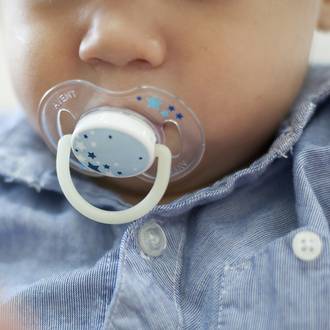Shop
01866
https://www.under5s.co.nz/shop/Hot+Topics+Articles/Health+%26+Wellbeing/Babies/10+Steps+to+ditching+your+toddlers+dummy.html
10 Steps to ditching your toddler's dummy
|
Is it time to ditch your toddler's dummy? The longer you leave it to get rid of your toddler's dummy, the more attached they will become to it. Bite the bullet while they're young and the agony will be less in the long run (although it may not feel like it at the time!). Make a start and follow these 10 simple steps.
|
You might also be interested in ...
A life saver for prem babies
Life-Saving Lung Treatment for Premature Babies - Perhaps one of the most important medical breakthroughs of our time was developed by a New Zealander, Graham "Mont" Collingwood Liggins.
Baby wind problems
It’s a fact, all babies get wind or produce gas! We take a look at where it comes from, why infant wind causes pain and discomfort and the treatment available for babies with wind problems.
join usJoin us on social media for all our latest news. |
sign upSign up and receive our latest newsletters. |
|







The longer you leave it to get rid of your toddler's dummy, the more attached they will become to it.
Bite the bullet while they're still young and the agony will be less in the long run (although it may not feel like it at the time!). The longer you leave it to take away their dummy, the harder and more attached they will become to it.
Weaning from 12 to 18 months is ideal, because dummies can cause real problems with older children.
The long term effects of using a dummy can push the palate of your toddler's mouth upwards, forcing their teeth out of line. It may also affect their speech and language development later on.
Getting rid of your toddler's dummy should be a gradual process. Perhaps start with a simple explanation telling them it’s time to give up their dummy and why.
It's important to let your toddler know the plan so that they’re fully prepared.
10 Steps to ditching your toddler's dummy
1. Don't rush to get rid of your toddler's dummy
You won't wean your toddler off their dummy overnight.
It's less stressful if you can try to plan to take a couple of weeks to get rid of their dummy, so everyone can make that gradual adjustment.
Start by explaining very simply, ‘You're a big girl/boy now. Dummies are for babies and smaller children.'
2. Make a dummy deal with your toddler
Agree with your toddler not to use their dummy outside the house.
Tell them: ‘We're going to the shops. We've agreed to no dummy, so we'll take a toy instead.'
If your toddler throws a tantrum whilst you’re out or before you leave demanding their dummy, stay calm and remind them of the deal.
Once they’re used to not using a dummy outside the house, you can start to limit it at other times too.
3. Don't feel guilty about ditching your toddler's dummy
Remember, when you're trying to change your toddler's behaviour, it always gets worse before it gets better.
Don't start feeling guilty, you're not depriving your toddler of love and cuddles.
4. Distract your toddler when they want their dummy
By distracting them every time they want their dummy, your toddler will slowly start to not rely on it as much.
Perhaps keep a small box in your pocket or handbag filled with small toys and other interesting objects to help distract them.
When your toddler demands their dummy, say, 'What's in my box?' Change the contents regularly to keep their interest.
5. Stand firm on getting rid of your toddler's dummy
Don't give in, however exasperating it can be! Set a boundary and stick to it.
Distract your toddler with the ‘magic box' as often as you need to. You will get there!
6. No sweet treats
If you offer sweet treats or food when your toddler wants a dummy, you are weaning them off one habit onto another.
Try not to use food for bribes and rewards.
7. Drop nicknames for your toddler's dummy
Toddlers love their dummies and often personalise them with a special name.
When you start to wean them off their dummy, drop the nickname to help remove the closeness and connection that they have with their dummy.
8. Give your toddler's dummy away
When you feel the time is right, plan with you toddler how you will give their dummy away.
A formal ‘giving away' ceremony gives your toddler the responsibility of letting go.
They can hand their dummy to a newborn baby, put them in the bin or leave them out for the ‘dummy fairy’ to collect over night.
9. Use dummy sticker charts
Reward your toddler for a dummy-free morning or shopping trip with a sticker on a chart.
Offer them rewards or a special outing once they’ve collected five no-dummy stickers.
10. Get support
You will need support as your toddler goes through the dummy weaning process.
Tell family, friends and childcare staff what you're doing, so everyone knows the plan and no-one gives in.
More kids articles to enjoy:
- First visit to the dentist
- How to stop the thumb sucking
- The effects of dummies & thumb sucking on kids teeth
Image source: Fiveprime